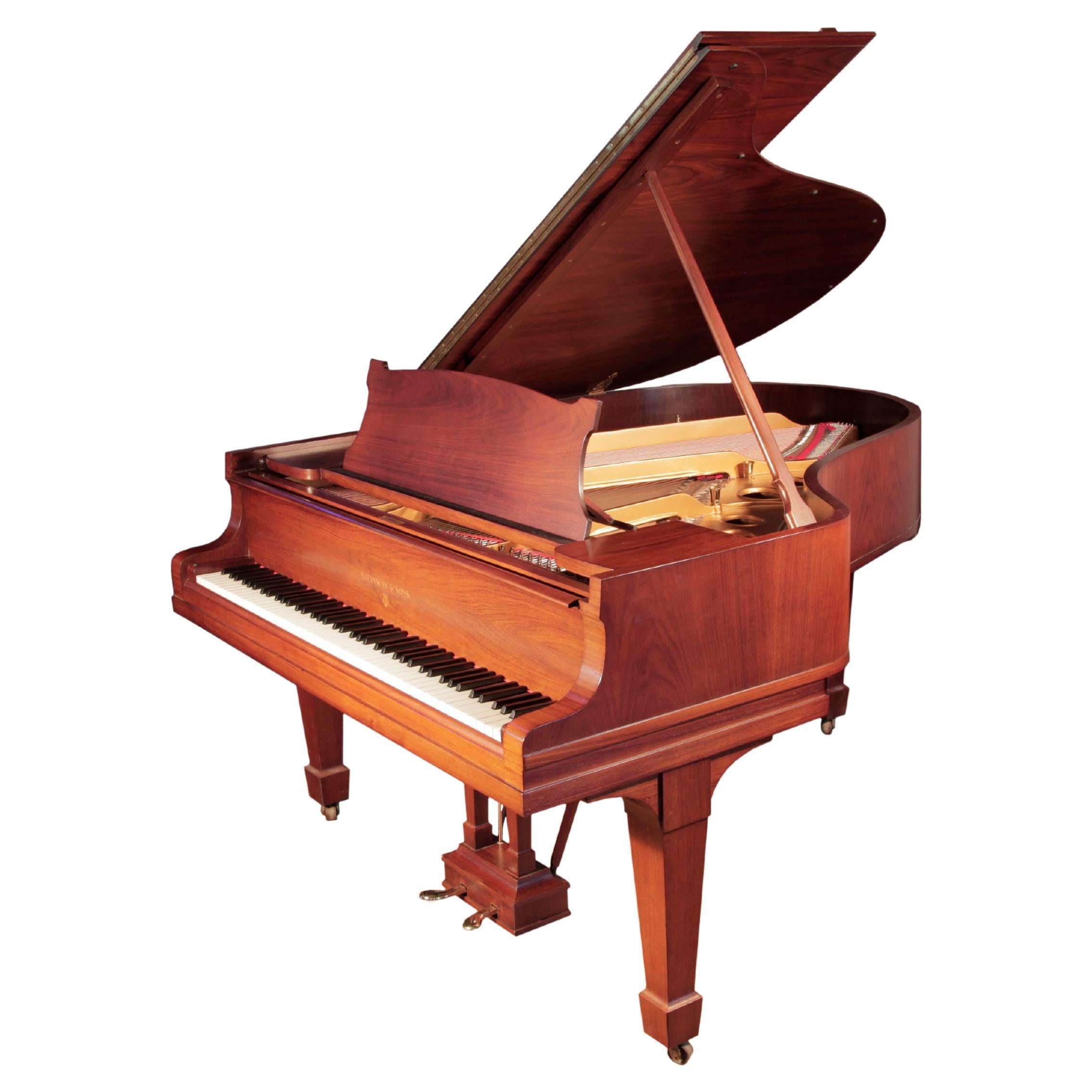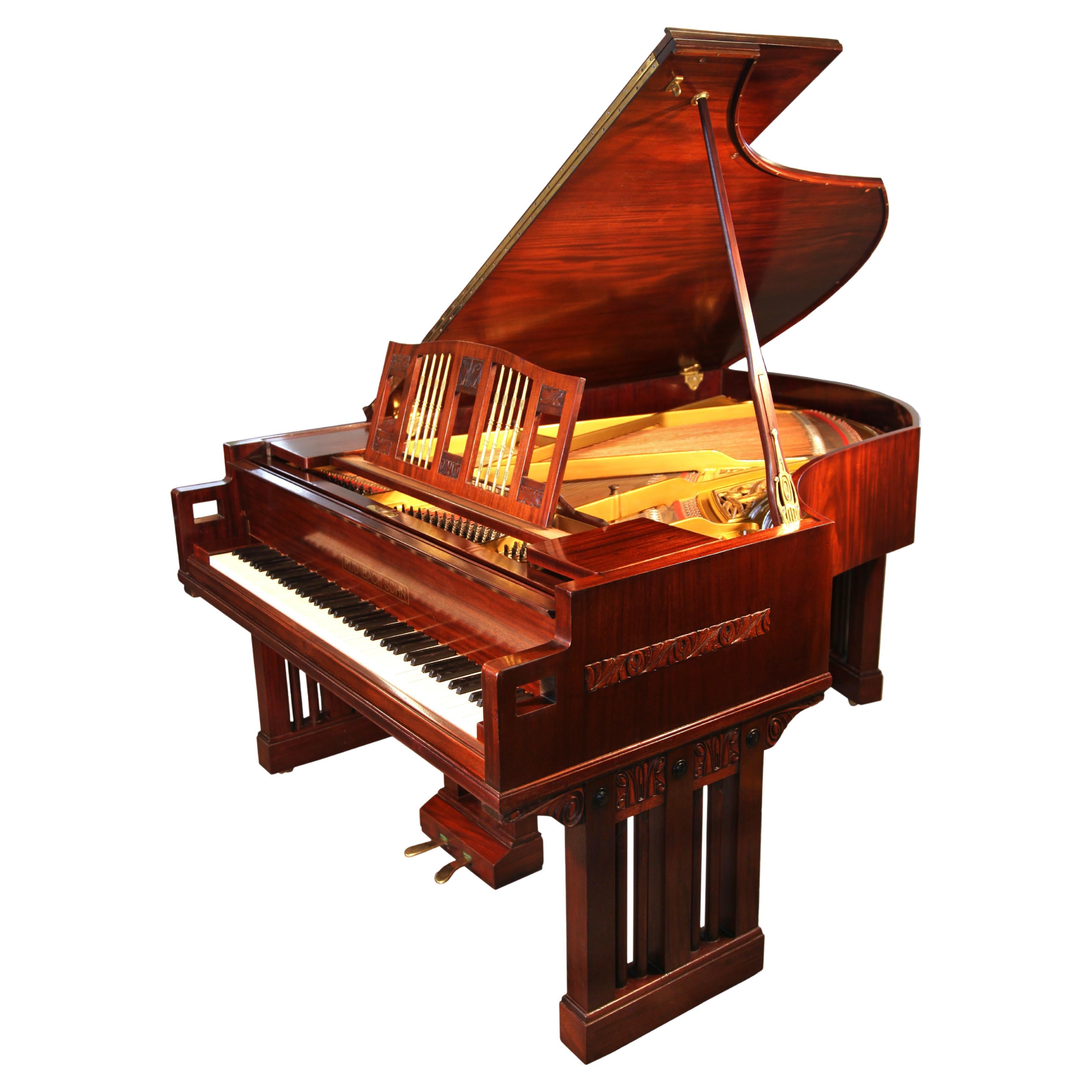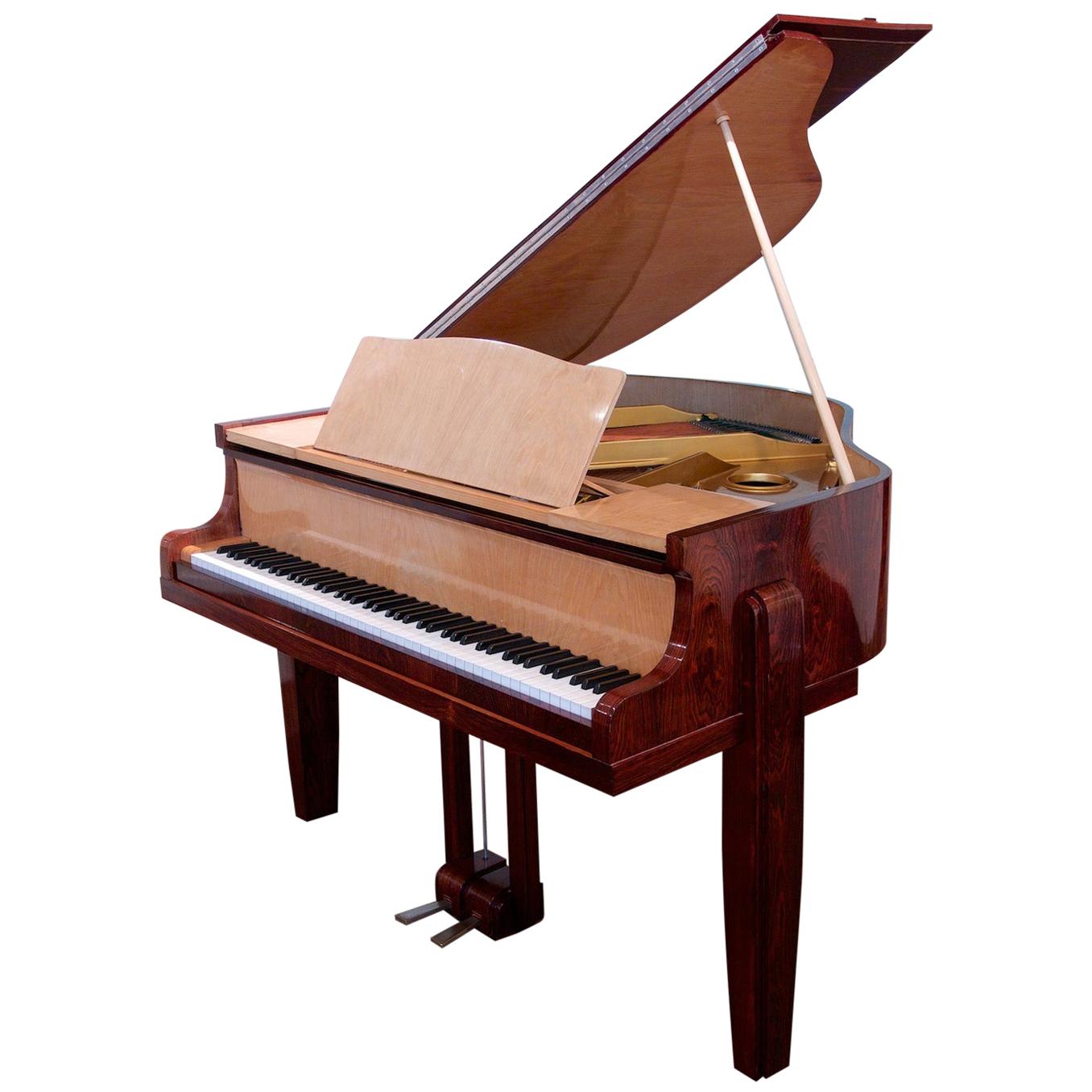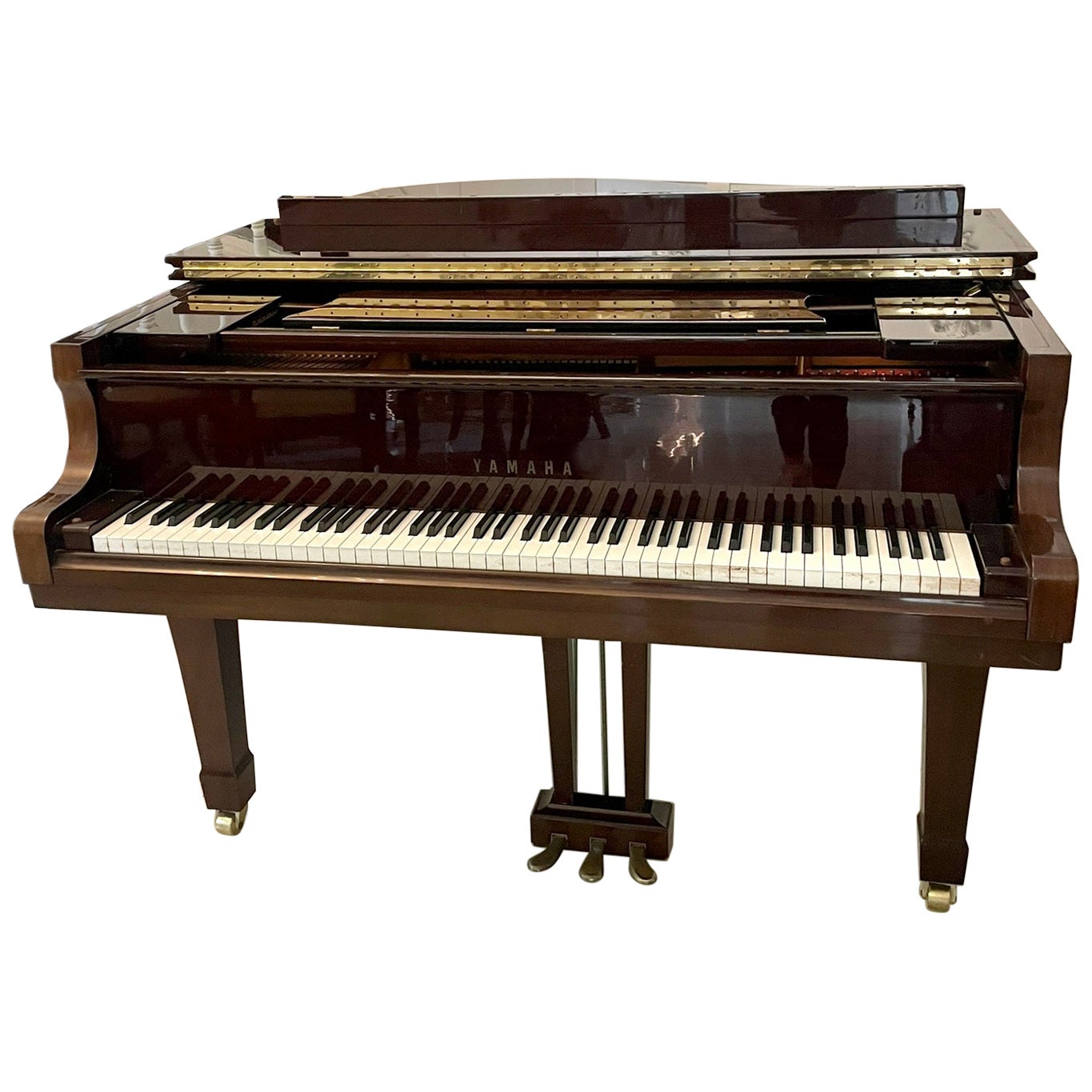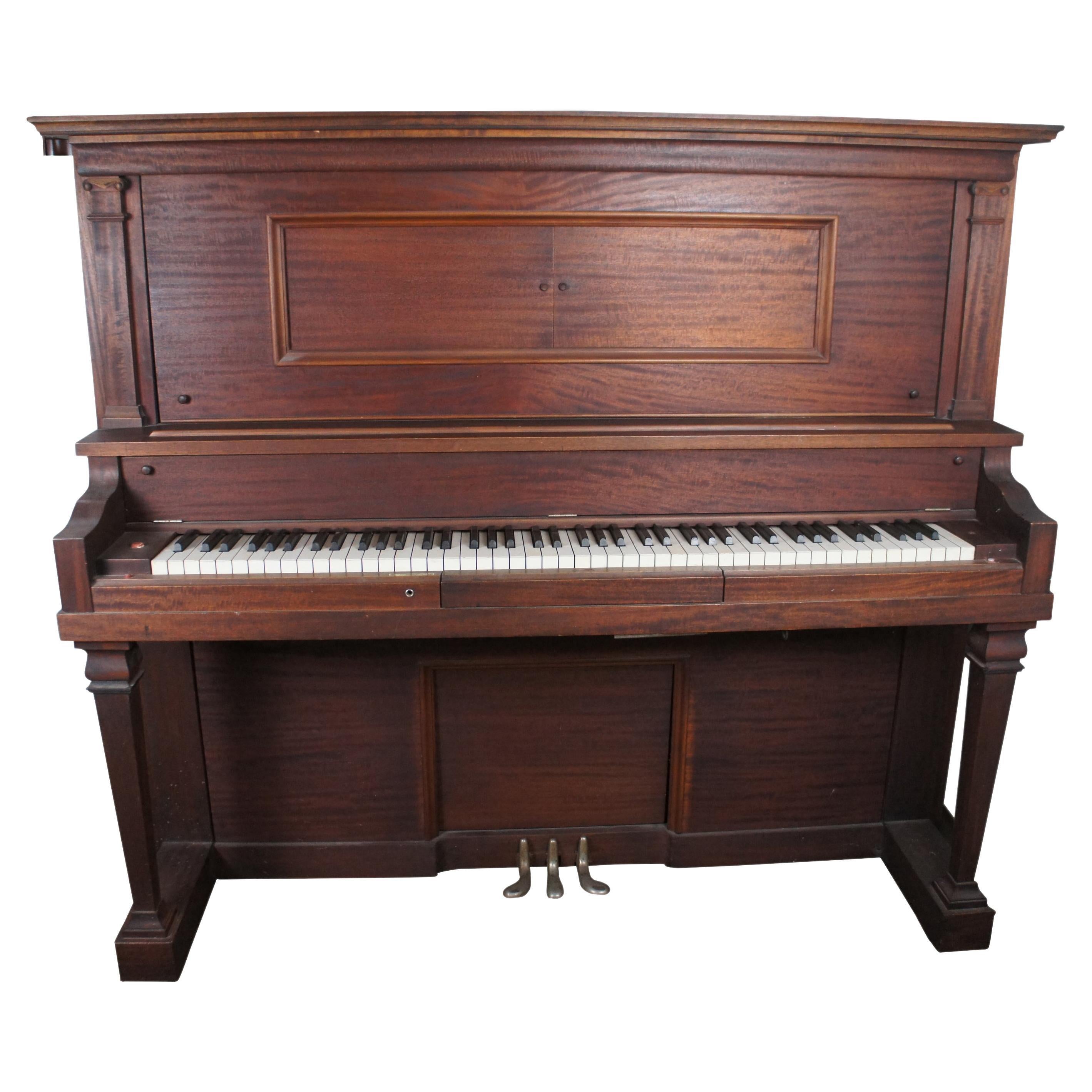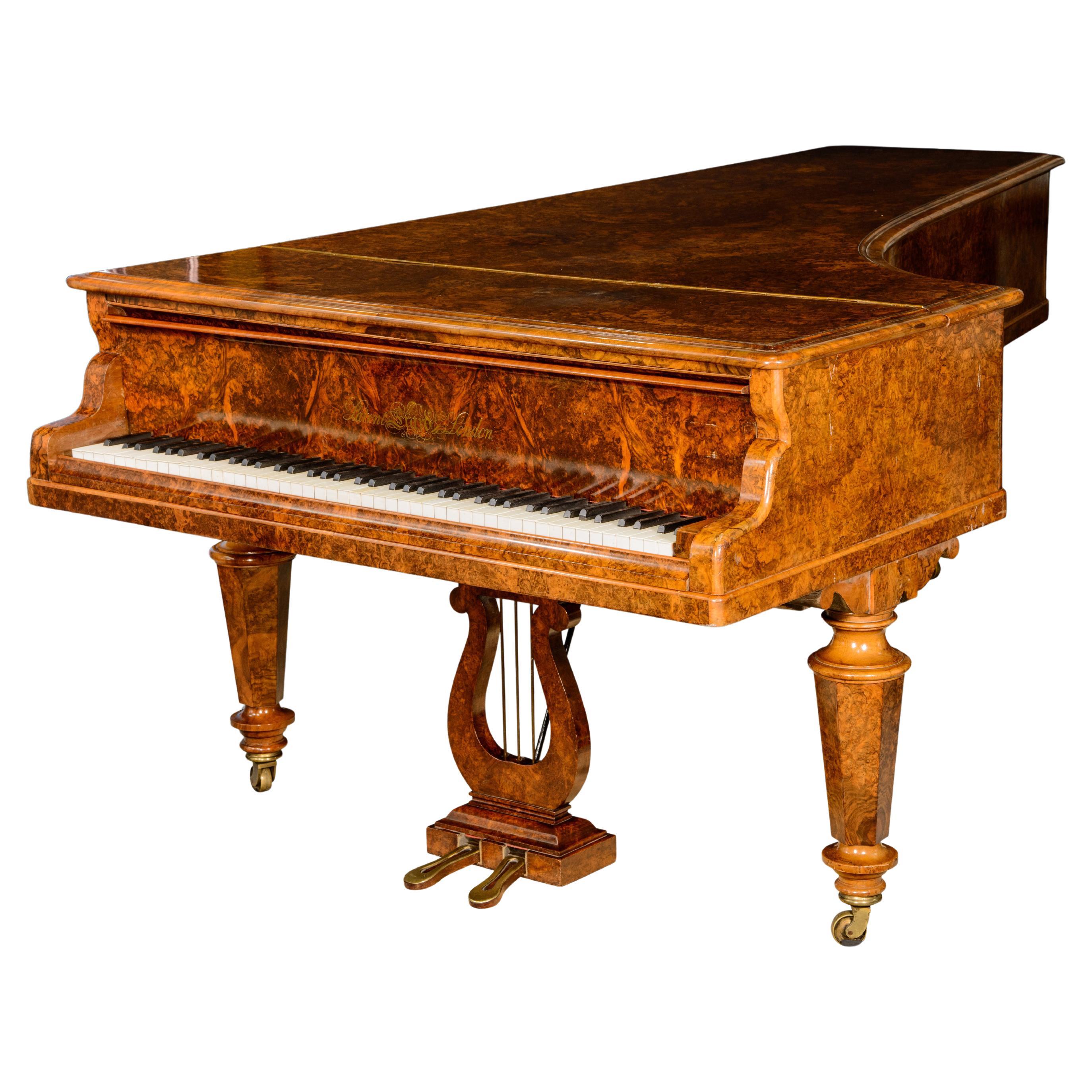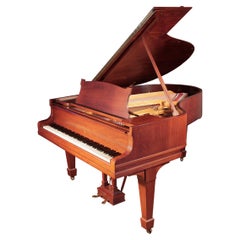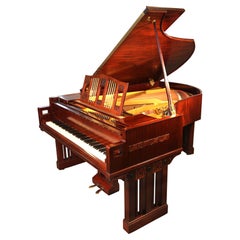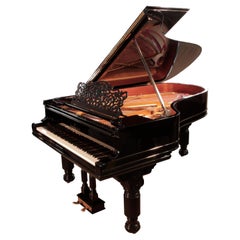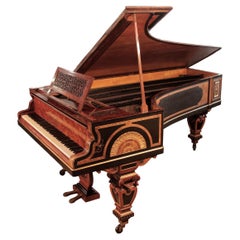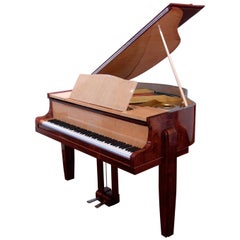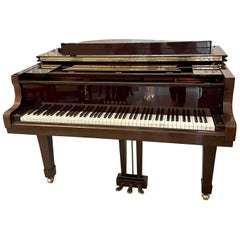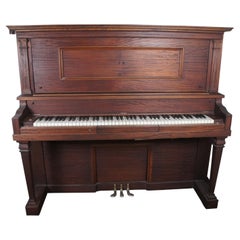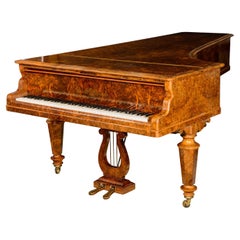Items Similar to Art Deco Strohmenger Baby Grand Piano Figured Walnut Square Legs and Lyre
Want more images or videos?
Request additional images or videos from the seller
1 of 9
Art Deco Strohmenger Baby Grand Piano Figured Walnut Square Legs and Lyre
$35,817.28
£26,300
€30,816.83
CA$50,275.29
A$54,995.47
CHF 28,653.36
MX$661,719.03
NOK 362,856.67
SEK 340,687.64
DKK 230,126.16
About the Item
Art Deco style, 1945, Strohmenger baby grand piano with a polished, book-matched, figured walnut case and brass fittings. The high arched piano cheek ends with an angular square cut. Piano has square, fluted legs with circular casters. The two-pedal piano lyre is attached to the cabinet with a central rectangular column. The music desk has scalloped corners and features contrasting, asymmetrical, figured walnut. The piano lid folds open at the front and lifts from the back onto a short, rectangular stay rod. The back of the piano cabinet is shaped in a semi-circle design. Piano has an eighty-five note keyboard.
Art Deco combined the styles of early 20th century Modernist, with the craftsmanship and luxurious materials of French historic design.
It was not a single style, but a composite of a variety and sometimes contradictory styles. It explored the decorative aspects of geometric elements and forms. Simple geometric shapes like triangles, circles and squares are the basis of design composition.
- Dimensions:Height: 39.38 in (100 cm)Width: 54.34 in (138 cm)Depth: 50.01 in (127 cm)
- Style:Art Deco (In the Style Of)
- Materials and Techniques:
- Place of Origin:
- Period:
- Date of Manufacture:1945
- Condition:Wear consistent with age and use. Minor fading. Price includes restoration.
- Seller Location:Leeds, GB
- Reference Number:Seller: Ref 20411stDibs: LU6879240834182
About the Seller
No Reviews Yet
Vetted Professional Seller
Every seller passes strict standards for authenticity and reliability
Established in 1979
1stDibs seller since 2022
5 sales on 1stDibs
- ShippingRetrieving quote...Shipping from: Leeds, United Kingdom
- Return Policy
Authenticity Guarantee
In the unlikely event there’s an issue with an item’s authenticity, contact us within 1 year for a full refund. DetailsMoney-Back Guarantee
If your item is not as described, is damaged in transit, or does not arrive, contact us within 7 days for a full refund. Details24-Hour Cancellation
You have a 24-hour grace period in which to reconsider your purchase, with no questions asked.Vetted Professional Sellers
Our world-class sellers must adhere to strict standards for service and quality, maintaining the integrity of our listings.Price-Match Guarantee
If you find that a seller listed the same item for a lower price elsewhere, we’ll match it.Trusted Global Delivery
Our best-in-class carrier network provides specialized shipping options worldwide, including custom delivery.More From This Seller
View AllRebuilt Steinway Model O Grand Piano Polished Walnut Spade Legs
Located in Leeds, GB
Rebuilt, 1925, Steinway Model O grand piano for sale with a polished, walnut case and spade legs. Piano has an eighty-eight note keyboard and a two-p...
Category
Early 20th Century German Musical Instruments
Materials
Brass
Arts and Crafts Ibach Grand Piano Mahogany Designed by Dutch Architect Cuypers
Located in Leeds, GB
A 1916, German Arts and Crafts, Ibach grand piano with a mahogany case and carved panel detail. The mahogany cabinet is polished so as to emphas...
Category
Early 20th Century German Arts and Crafts Musical Instruments
Materials
Brass
Rebuilt Steinway Model B Grand Piano Arabesque Music Desk Fluted Barrel Legs
Located in Leeds, GB
Rebuilt, 1886, Steinway Model B grand piano with a black case.
The music desk is in an openwork arabesque design featuring a central lyre motif
surrounded by stylised tendrils and foliage. The serpentine piano cheek features a dual linear case moulding. The piano lyre has two fluted spindle upright supports with two brass pedals and a brass footplate. The fluted, barrel piano legs have sunken brass casters. The leg pediment is carved with a stylised flower and curlicues. Piano has an eighty-five note keyboard.
Enjoy the vintage styling of an antique Steinway...
Category
Antique Late 19th Century German Musical Instruments
Materials
Brass
Erard Grand Piano Egyptian Revival Neoclassical Style by William Lomax Walnut
Located in Leeds, GB
An 1861, Erard grand piano with an ornate burr walnut, black and gilt cabinet. Piano casework features Egyptian Revival and Neoclassical elements. Th...
Category
Antique Mid-19th Century English Neoclassical Musical Instruments
Materials
Porcelain, Walnut, Giltwood
Art Deco Barker Upright Piano Chrome Mahogany Geometric Case Styling
Located in Leeds, GB
A 1930's Barker upright piano with an Art Deco style mahogany case. Cabinet features strong angular styling, evident in the chamfered corners at the top and b...
Category
Early 20th Century English Art Deco Musical Instruments
Materials
Chrome
Adams Style Bluthner Grand Piano Quarter Cut Satinwood Inlaid Swags and Bows
Located in Leeds, GB
Adams style, 1911, Bluthner grand piano with a french polished, quarter cut, satinwood case with boxwood stringing inlay and crossbanding accents. The satinwood veneer of the cabinet...
Category
Early 20th Century German Adam Style Musical Instruments
Materials
Brass
You May Also Like
Pierre-Paul Montagnac Modernist Piano
By Pierre-Paul Montagnac
Located in Philadelphia, PA
French Modernist Art Deco piano and bench by Pierre-Paul Montagnac, a variant of the model used in one of the luxe apartments, the Caen, on the great French oceanliner Normandie in 1935. Created in rosewood and sycamore, and carefully and correctly restored, including the fine Erard (#127208) instrument. 56” wide x 60” deep. Documented in numerous sources, including the July 1935 issue of Art et Decoration.
Pierre-Paul Montagnac
(1883-1961)
Born in Saint-Denis, France on 9 May 1883, Pierre-Paul Montagnac was equally talented as a fine artist and a decorative artist. He was educated in both disciplines, studying with Eugene Carriére as well as at the Académie de la Grande Chaumiére, both in Paris.
His inaugural exhibition was at the 1912 Salons – and at the 1920 Salon d’Automne he received a traveling scholarship. In 1918 he began working in the firm of André Mare and from 1922 collaborated with Maurice Dufrene at La Maîtrise, the famous design studio of Galeries Lafayette. From 1921 he exhibited at the Salons of la Société des Artistes Décorateurs, Salon des Architectes Modernes,
and internationally, in Barcelona and Leipzig. He designed suites on the grand French oceanliners, l’Atlantique, Normandie and Pasteur.
At the 1925 Paris International Exposition his work was in a standout class. At the 1937 Exhibition he organized the pavillion of the Artistes Decorateurs and personally won a Grand Prix. For the New York Exhibition in 1938, he was a member of the international jury, organized the group of Decorators, and, as architect, organized the exhibitions of jewelry and perfumes.
He became a member of the Society of Modern Architects and executed important and numerous architecture and decorating projects including the luxury apartments on the great French oceanliners l’Atlantique, Pasteur, and Normandie.
Vice President and then President of the Societe des Artistes Decorateurs from 1930-1938, he was also President of the Salon d’Automne and Vice President of the Committee of the Exhibition of Arts and Embellishments of Life; member of the steering committee of C.T.I. and Artistic Property, member of the Board of Directors of the Central Union of Decorative Arts. He was also an Officer of the Legion of Honor and received the Cross of War.
MONTAGNAC was the son of an engineer and he had a taste for geometry
and science that predisposed him to the rigors of architectural laws.
Multi-talented, he worked independently as a painter – who had
paintings acquired by the French government – while also working in
the related fields of architecture and decoration. His work included
homes, apartments, galleries, luxury shops, banks and the aforesaid
oceanliners.
As a designer/decorater, Montagnac had the taste for quality, luxurious
furniture, using precious woods, bronze extensions, ivory inlays, mother-of-pearl,
metal and coral. He advocated for a resolutely modern style and, free of all
pastiches, focused on beautiful cabinetry, the challenges of furniture design,
particularly from 1940 to 1945, captured all his attention.
The tireless activity of Montagnac, whose varied works are represented in
official museums and residences, was also recognized from a professional
and social point of view. He was a remarkable organizer, devoted to the
cause of art, to the defense of the trade and his colleagues. It was Montagnac
who, in 1939, with Anatole de Monzie, took the initiative to found the
ENTRAIDE to Artists (which provides support to talented young French artists).
MOBILIER ET DECORATION, September/October 1953
ERARD
An illustrious piano manufacturer, Sebastien Erard began building superior harpsichords in Paris in the mid-1700s, produced pianos for the French Court, and received a multitude of patents, many of which are still in use in piano manufacturing. Erard pianos were marketed as the finest pianos in the world and were owned by Queen Victoria, Franz Liszt, Chopin, Verdi, Ravel, and Felix Mendelssohn among many others. They continued to enjoy international success well into the 20th century. They were known for their unique sound quality, similar to the American square grand piano...
Category
Vintage 1930s French Art Deco Musical Instruments
Materials
Rosewood, Sycamore
Yamaha Baby Grand Quality Mahogany Piano Model C2
Located in Suffolk, GB
Quality Yamaha baby grand piano with an overstrung iron frame, frame and sound board in perfect condition, mahogany case standing on square tapering legs wi...
Category
Late 20th Century English Musical Instruments
Materials
Other
$15,202 Sale Price
20% Off
Antique 1915 Mahogany Chicago Cable Company Carolina Inner Player Upright Piano
Located in Dayton, OH
Antique Victorian player piano by The Cable Company of Chicago which features a Carolina Inner-player. Circa 1915.
Includes: I Love Paris and Oh Lady Be Good by Max Kortlander, He...
Category
Vintage 1910s American Edwardian Musical Instruments
Materials
Mahogany
$2,625 Sale Price
25% Off
Grand piano. Walnut, metal, etc. Patent Erard London. London, England, possibly
Located in Madrid, ES
Grand piano. Walnut, metal, etc. Patent Erard London. London, England, possibly around 1870.
Requires tuning and minor restorations.
Grand or horizontal piano with strings and sou...
Category
Antique 19th Century European Other Musical Instruments
Materials
Other
Antique Steinway & Sons Gold Bronze & Satinwood Baby Piano Circa 1910
Located in New Orleans, LA
This piano was made in the Hamburg Steinway & Sons factory and decorated in France. It is a beautiful instrument. As with most pianos, special shipping will be needed.
Category
Early 20th Century German Musical Instruments
Materials
Ormolu
Piano " Offberg " 20th Century
Located in Madrid, ES
Piano " Offberg " 20th century
150cm x 100cm x 55cm
walnut wood
good condition
Category
20th Century German Modern Musical Instruments
Materials
Walnut
